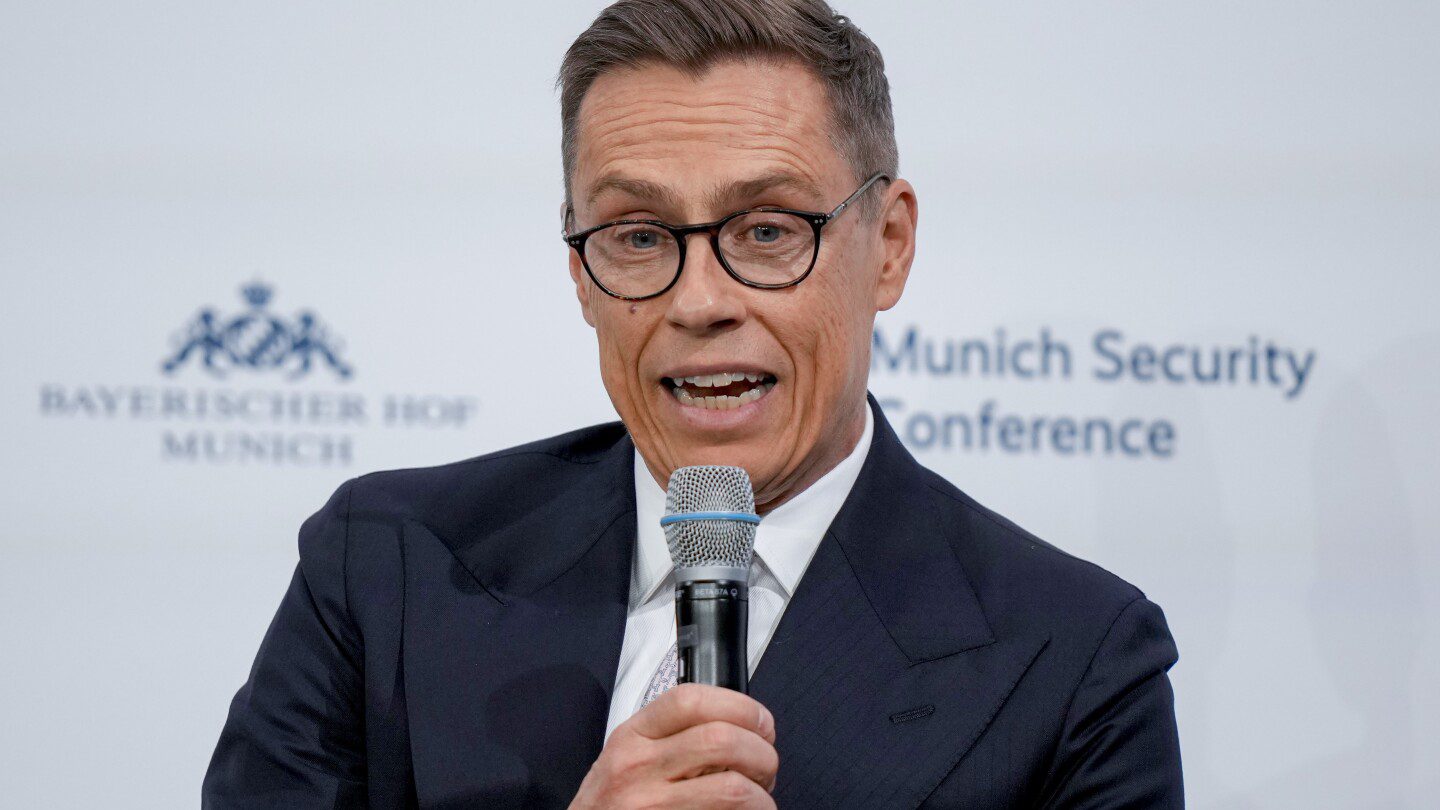
MUNICH (AP) — On Sunday, Finland’s president called for strengthening Ukraine’s defenses and applying “maximum pressure on Russia” through sanctions and asset freezes ahead of anticipated peace talks facilitated by the U.S. aimed at resolving the ongoing conflict. France is preparing to lead a summit to consolidate Europe’s response to assertive diplomacy from the U.S.
On the final day of the Munich Security Conference, Alexander Stubb and other European leaders discussed how the European Union could transition from dialogue to decisive action and maintain relevance as the U.S. pushes for an end to hostilities. Stubb outlined a three-step approach: “pre-negotiation,” ceasefire, and long-term peace discussions.
“The initial step is pre-negotiation, which necessitates rearming Ukraine and placing substantial pressure on Russia through sanctions and the freezing of assets, allowing Ukraine to enter negotiations from a position of strength,” he articulated.
Early indications suggest EU leaders are primed for a swift response.
French Foreign Minister Jean-Noel Barrot announced on Sunday that French President Emmanuel Macron would gather major European nations for an urgent “working meeting” in Paris on Monday to evaluate further actions regarding Ukraine following the U.S. announcements last week. Barrot shared this information during an interview on France-Info.
“The president will convene key European countries tomorrow to discuss European security,” Barrot said, highlighting the frequency of such meetings while emphasizing that European leaders are in “constant contact.”
Reports indicate that Prime Ministers Keir Starmer of the UK, Mette Frederiksen of Denmark, and Donald Tusk of Poland are among those expected to participate.
“A spirit of unity is sweeping across Europe, perhaps more profoundly than since the COVID-19 pandemic,” Barrot remarked, stressing the increasing solidarity among European allies.
Trump’s Diplomatic Strategy Shaping the Landscape
U.S. President Donald Trump’s pursuit of a rapid resolution to the Ukraine conflict has generated concerns and uncertainties during the Munich discussions.
After a recent phone conversation with Russian President Vladimir Putin, Trump expressed that he and Putin would likely soon meet to negotiate a potential peace agreement concerning Ukraine. He later reassured Ukrainian President Volodymyr Zelenskyy that he would be included in the discussions. However, U.S. officials have indicated that European nations might not be part of this dialogue.
“Don’t underestimate Trump as a negotiator; I genuinely believe that Putin is perplexed and wary of what may arise from this situation,” Stubb remarked. “Currently, the initiative lies with us in Europe. We must demonstrate to the Americans where our value lies and return to the negotiating table.”
“In Europe, we should prioritize action over conversation,” he added.
Latvian President Edgars Rinkēvičs, whose country also borders Russia, concurred, stating that “if we display strength and offer something substantial, we will capture the United States’ interest. Engaging only in nice discussions without action won’t hold our public’s interest for long.”
Kremlin spokesman Dmitry Peskov told Russian state media on Sunday that the Trump-Putin conversation indicated that Washington and Moscow would attempt to address issues through dialogue, focusing on peace rather than conflict.
In a Telegram update on Sunday, Zelenskyy claimed that Russia “confirms its intention to persist in the conflict by continuously striking Ukraine,” stating that this week, “nearly 1,200 aerial bombs, over 850 strike drones, and more than 40 different types of missiles have been launched against our people.”
Other Topics at Munich: Trade and Tariffs
The three-day Munich conference served as a hub for multifaceted diplomacy covering political, economic, and security matters, with representatives attending from varied regions, including Syria, Saudi Arabia, Japan, South Korea, and multiple European nations.
On Saturday, Zelenskyy advocated for the establishment of an European armed forces to better counter a potentially expansionist Russia, which could pose a threat to the EU.
Zelenskyy also instructed his ministers not to endorse a proposed agreement granting the U.S. access to Ukraine’s rare earth minerals, citing that the agreement excessively favored U.S. interests.
This proposal was a significant topic of discussion with U.S. Vice President JD Vance during the Munich event, as reported by one current and one former senior Ukrainian official who were privy to the discussions. Zelenskyy’s decision to withhold signing the agreement, at least for now, was described as “short-sighted” by a senior White House representative.
Additionally, on Saturday, Japanese Foreign Minister Takeshi Iwaya revealed that he had requested U.S. Secretary of State Marco Rubio to exempt Japan from steel and aluminum tariffs and reciprocal tariff measures.
Iwaya, who briefly spoke with the U.S. diplomat during the conference, also “raised the issue” of auto tariffs, though he did not provide further details. Should these auto tariffs be implemented, the repercussions for the Japanese automobile industry could be substantial, according to experts.
___
Contributors to this report include Associated Press writers Joanna Kozlowska in London, Angela Charlton and Thomas Adamson in Paris, and Jamey Keaten in Lyon, France.









